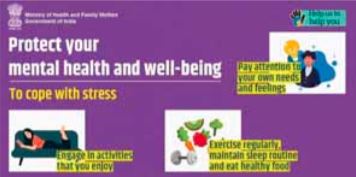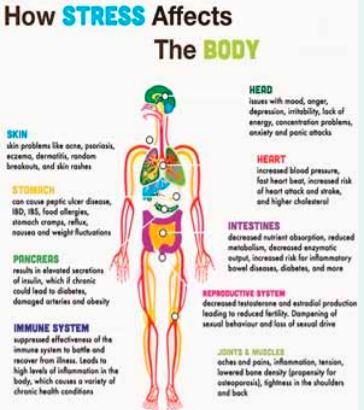
While the armed forces protect the people of the country from external enemies, the police force ensures law & order is maintained. In order to control the spread of coronavirus, lockdown was enforced across the country. Almost the entire strength of police force was deployed. The lockdown was successful due to the dedication of the force. The challenge for the police was tremendous. Huge population, unruly, careless people had to be convinced to follow lockdown rules. The police slogged day and night. Working beyond your health limits causes stress.
A healthy young police inspector without any previous illness returns home after work. Early morning, he experiences severe chest pain. His family takes him to hospital. On examination by doctors, it is found that he has suffered heart attack due to stress. Our body is geared to manage stress in small doses but when the stress prolongs or repeats it can adversely affect your health.
Facts:
- 43 adults out of100 suffer ill effects of stress.
- 75-90% visit clinic for stress related complaints and illness.
- Occupational safety and health administration (OSHA) declared stress a hazard of the workplace.
- 50% of emotional disorders experienced are due to long duration and untreated stress reaction.
- Stress, imposes huge money burden on society like medical bills, sickness & absenteeism.
 Not all stress is bad though. Stress keeps us aware of things around us and focused. It gives us strength to get more work done. Stress symptoms can be acute (short duration) or chronic (long duration).
Not all stress is bad though. Stress keeps us aware of things around us and focused. It gives us strength to get more work done. Stress symptoms can be acute (short duration) or chronic (long duration).
Acute stress: All of us have experienced stress that lasts for a short period of time in life. This is normal, for example while talking in front of a crowd. This is positive stress and short-lived.
Chronic stress: If we allow stress to prolong, it can have damaging effects on our physical, mental and emotional health in the form of headache and sleep problems.
Stress effects on human parts are shown in this picture.
 Stress is a physical or emotional pressure suffered by a person or animal. While restoring or adjustable capacity of the person is buried below a strong emotional effect of events, this is stress. The event can be significant or insignificant. Even favourable changes (example: promotion and transfer) involving changes in behaviour can produce stress. Stress is based on personal feelings, tastes or opinions of individuals or person. Bodily physiological function capacity decides the response to stress.
Stress is a physical or emotional pressure suffered by a person or animal. While restoring or adjustable capacity of the person is buried below a strong emotional effect of events, this is stress. The event can be significant or insignificant. Even favourable changes (example: promotion and transfer) involving changes in behaviour can produce stress. Stress is based on personal feelings, tastes or opinions of individuals or person. Bodily physiological function capacity decides the response to stress.
Cause of stress differs with age. For example: in young adults: reason for stress could be marriage, or parent child relationship, work colleague relationship, financial problems.
Middle Age: Marital problems, old parents, problems with young adult in the family.
Old age: financial problems, retirement, loss of energy, personal losses and thoughts of death.
A person or individual may respond to stress by becoming nervous, uneasy, worried, anxious, unhappy, despondent, weak or depressed. A stressed person could also resort to smoking, drinking or getting into relationship.
Some of the common responses are:
- Fear (of repetition of the stress-inducing event)
- Rage (at frustration).
- Guilt (over aggressive impulses)
- Shame (over helplessness)
Stress can be seen as irritability, restlessness, fatigue(tiredness), over alertness, feeling of tension. The stressed person resorts to self-medication, drinking alcohol/ cigarette smoking, consumption of over the counter tablets like sleep inducing pills.
Stress can cause:
- Difficulty in Attention to tasks.
- Difficulty in concentration.
- Sleep problems.
- Body pains.
Stress Treatment
Stress will not affect you negatively, if you learn to handle it. A few things you can try include:
- Identify what causes you stress and find ways to steer clear or avoid those situations.
- Prioritize your goals. Take a break and be forgiving.
- Create a network of close friends and co-workers, you can go to when stress starts to build. A hobby, a pet animal, gardening or a cause to volunteer for can be good outlets.
- Cut down on smoking and drinking. While alcohol and tobacco have had a reputation for helping you relax, on the contrary, they actually can make you more anxious.
- Exercise or a 15 to 20-minute walk thrice a week can relieve stress.
- Meditation, breathing exercises, deep breathing, yoga, etc can quieten the mind.
- Get a good night’s sleep. You may need to cut down on coffee & tea drinking during the day and TV / smart phone use, screen time at night.
- A to-do list for the next day can get you a more restful night’s sleep.
If these steps don’t help you manage your stress, consult a specialist.
Dr. Bharath Bhushan. M,
Trained & Worked at N.I.M.H.A.N.S, Bengaluru.
Neuro- Psychiatrist,
Diya Orthopedics and Rehabilitation Clinic, Bhashyam Circle, Rajajinagar, Bengaluru. www.drbharath.co.in
Ph No.: +91 9483715617













